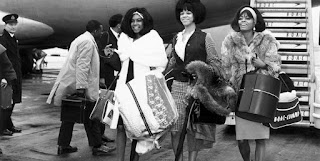In Chic Fashion: A Chic History Of Fur & The Significance For Black Women
There's a long history when it comes to Black women and the fur industry. Often seen as a symbol of elegance and grandeur, fur played a significant role in the lives of many women - Black women in particular.
My personal love affair with fur began as a child in church watching the elders arrive clad in full length furs and matching hats. I can remember my paternal grandmother donning pillbox style mink hats and even having one stolen off her head one morning en route to church in Brooklyn.
Furs were coveted items in the Black community and many saved for years to purchase one. Whether it was a stole, custom capelet or the natural floor length ranch mahogany mink style. Black celebrities also solidified the idea that furs were an "I made it moment". Diana Ross & The Supremes were always photographed in gorgeous fur looks, along with Marian Anderson and Billie Holiday to name a few.
Fur has long been the debate with animal activist and spearheaded by PETA, whom once referred to themselves as the "PR for animals". I was wearing fur during the days of being afraid to walk into Manhattan for fear of your coat being splashed with red paint. Activist were ruthless and aggressive during the early to late 90's in New York City. They would camp out in front of Saks, Bloomingdale's and other high-end department stores and harass women in fur coats.
Fur has long been the debate with animal activist and spearheaded by PETA, whom once referred to themselves as the "PR for animals". I was wearing fur during the days of being afraid to walk into Manhattan for fear of your coat being splashed with red paint. Activist were ruthless and aggressive during the early to late 90's in New York City. They would camp out in front of Saks, Bloomindales and other high-end department stores and harass women in fur coats.
I can still remember being gifted my first fur on my 14th birthday by my Godmother Catherine. She was the epitome of black elegance and shared her penchant for style with me every chance she got. 25+ years later I still have the cinched waist blonde mink jacket in my winter rotation. It's special, it has an emotional meaning to me and will forever be one of my favorites.
“In a way, passing down a fur coat is a modest gesture to prophesize a life of opulence and grandeur for a younger woman”, said Tanisha C. Ford, an associate professor of Africana Studies and History at the University of Delaware and author of "Dressed in Dreams," a book that explores the politics of Black fashion.
Fur has become a hot topic and debate for many in recent years with cities in California (Los Angeles & San Francisco) now banning the sale and New York attempting to follow suit.
Wearing fur has now been considered unethical and politically incorrect within the fashion landscape. When top fashion designers like Gucci, Stella McCartney and Chanel made the decision to halt the use of real fur in their designs it sent a message to the industry and the fall out has led to a 50% decline in sales.
Not everyone believes that the decline in the fur industry was the result of PETA and it's relentless attempt to shame fur lovers. I firmly believe race played an integral role in this new "awakening" and few are even comfortable to admit it.
White women have been purveyors of fur for decades. Often seen as a rite of passage or introduction to high society. Furs were gifted for weddings, purchased by husband's and handed down for generations. It wasn't until black women began to purchase furs that it became an "issue". Black women were in financial positions to afford the same luxury items as white women and even doing so without husband's.
Paula Marie Seniors, a historian and professor of Africana studies at Virginia Tech, recalls her mother saying, "As soon as black women could afford to buy mink coats, white society and white women said fur was all wrong, verboten, passé."
To date I own about a dozen fur coats, ranging from full lengths, jackets, stoles, and a custom piece from Ketchikan, Alaska I gifted myself after a 3 month stay during a contractual opportunity in 2019. I financed my first fur purchase. A mahogany ranch mink with my initials and my signature "Tres Chic Style" embroidered in the lining. I was in my 20's, single with TWO babies and I was buying a mink. My family thought I was crazy and secretly envied my purchase AND my decision to do what I wanted with my money.
Living in different regions of the country (as I have) you're met with varying experiences wearing your fur. As a Black woman living in Tennessee, my experiences have taken on a new meaning of "They Mad". I'm often met with stares, whispers of "Who does she think she is? ", the occasional eye roll to random conversations deeply rooted in racism and reminders that "they have one too at home". I can even recall being at a media event when I lived in Vegas and questioned by a 80 year old Jewish woman who loudly and boldly asked "I didn't know Negroes wore fur".
My plans are to begin gifting my daughter some of my coats while instilling the rich tradition and history that was passed down to me by my Godmother. And yes... I plan to purchase more coats, (new & vintage) while sashaying all up and through Walmart, The Dollar Tree and anywhere else I damn well please. This "Negro" (as I was referred to) made a decision to wear, appreciate and love my furs and all it's opulent and passé grandeur.




Comments